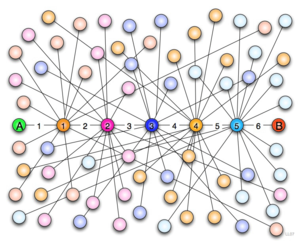A giant construction project disrupts the lives and the commute of many people who use the Washington DC (or Capital) Beltway and the business routes between the Beltway and the Dulles International Airport.
This same construction project also raises hope among many travelers that one day they can take the metro the full 30 miles or so from downtown Washington, D.C. to Dulles Airport for an international flight. In addition, the beltway will have “hot lanes” which will allow people willing to pay a hefty toll to drive in the faster lanes and to escape the punishing daily gridlock.
The Chaos of Construction
The construction is on a huge scale—where nothing looks like it used to, no trees line the roads, exits from the beltway are changed, intersecting concrete roads start and stop abruptly, bridges are gone, new bridges emerge in an unexpected place, and everywhere there are train tracks.
While many people might think this project is without parallel, to me it suggests another kind of herculean project, particularly those of the mind and will.
If you are writing a dissertation or another seemingly endless writing project, you see the resemblance.
The Chaos . . . and Cost . . . of Writing a Dissertation
As the costs mount for the Dulles Airport metro, municipalities and individuals dispute the wisdom of continuing to build all 23 miles of subway to the airport. The different authorities involved have wrangled over whether the subway should be above ground or below ground and which municipalities should contribute more money and less money. Similarly, the personal and financial costs involved in writing a dissertation may seem to you as if you’ll never get out from under them. And you wonder how completing the dissertation could be worth the huge burden you have taken on.
Showing Up Takes Mental Toughness and Planning
Not unlike the way you wrangle with texts and structure, trying to trace ideas through various pathways in your brain, returning day after day to an uncomfortable task that demands almost more than you can do, the workers in the beltway/Dulles metro construction zone labor on crazy flyover bridges high in the sky over what will be eight lanes of the DC Beltway.
The workers labor at road level, between lanes of traffic, on cranes, and on concrete piers. Below ground workers construct enormous tunnels.
Just like the worker in the construction zone, for you to return each day to a challenging, messy dissertation requires you to draw on your mental toughness and willpower. It takes grit to show up each day to work on a grueling writing project, with no end in sight, knowing that only occasionally will you find joy in the doing. What you know is that you have to keep your wits about you. And what you can count on is that you will find joy in having stuck with the project to its end.
Beyond the Beltway and the Tysons Corner area of Virginia where several new metro stations are being built, the work gradually slows. This is not yet the construction zone, but the plan is in place. Huge piles of stacked materials are staged for future work. The plan anticipates that the metro construction will reach this point and keep going.
The staged materials are evidence that a plan is in place. If workers show up each day and do their exhausting, demanding tasks, according to the plan, the job will proceed toward its end point, that is, its destination — Dulles International Airport.
What is more inspiring than anticipating what it will be like when this seemingly endless writing project is finished? What you anticipate feeling after you have traveled the long road to the Ph.D. is what the people committed to building the Metrorail to Dulles and the hot lanes on the beltway anticipate feeling when they see a completed project.
That Transcendent Feeling of Completion
Today, I drove toward Dulles Airport, the final destination for the Metro. As the iconic Dulles Main Terminal with the Blue Ridge Mountains in the background came into view, I felt some of that same excitement that finishing huge writing projects brings forth—that transcendent feeling of completion and a new beginning.
And that transcendent feeling of completion and new beginning is what I wish for you in this New Year of big writing projects.
Nancy
Nancy Whichard, Ph.D., PCC
Your International Dissertation Coach and Academic Career Coach
www.dissertationbootcamp.net
www.nancywhichard.com
nancy @ nancywhichard.com




